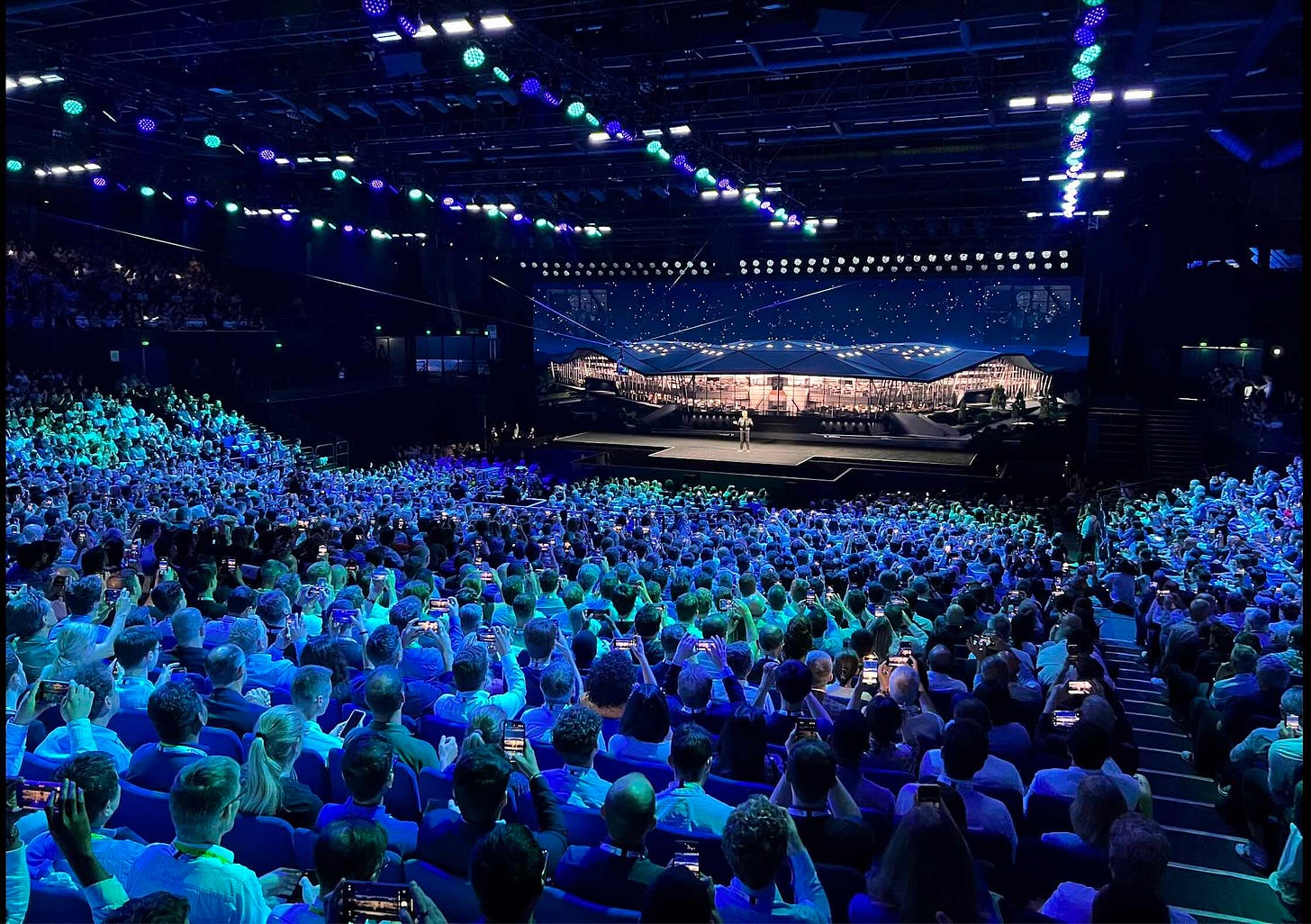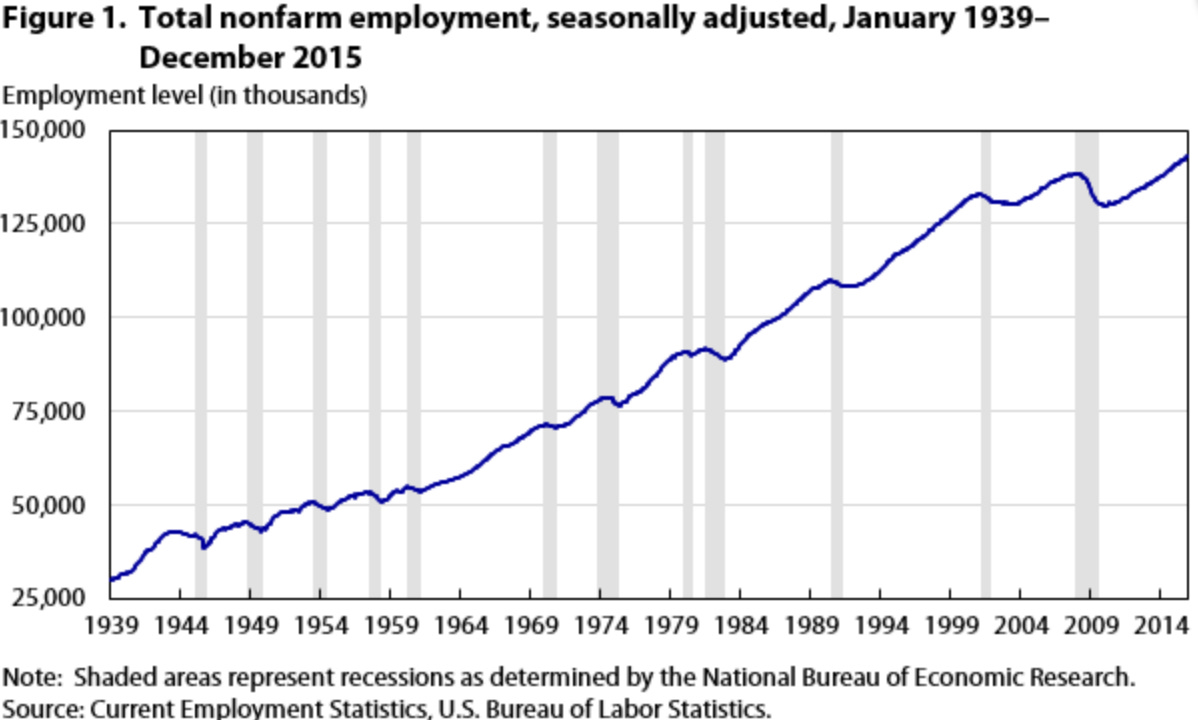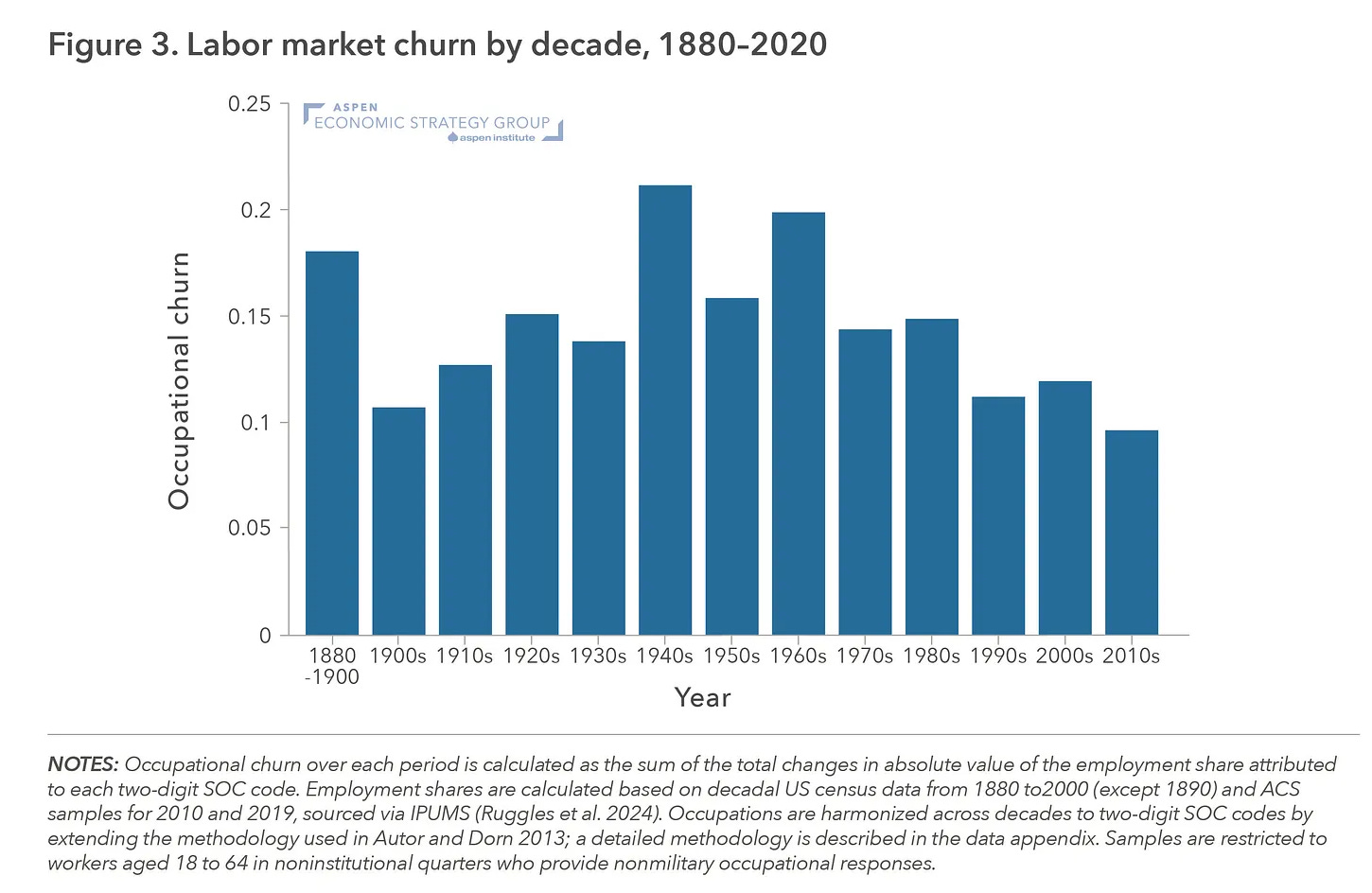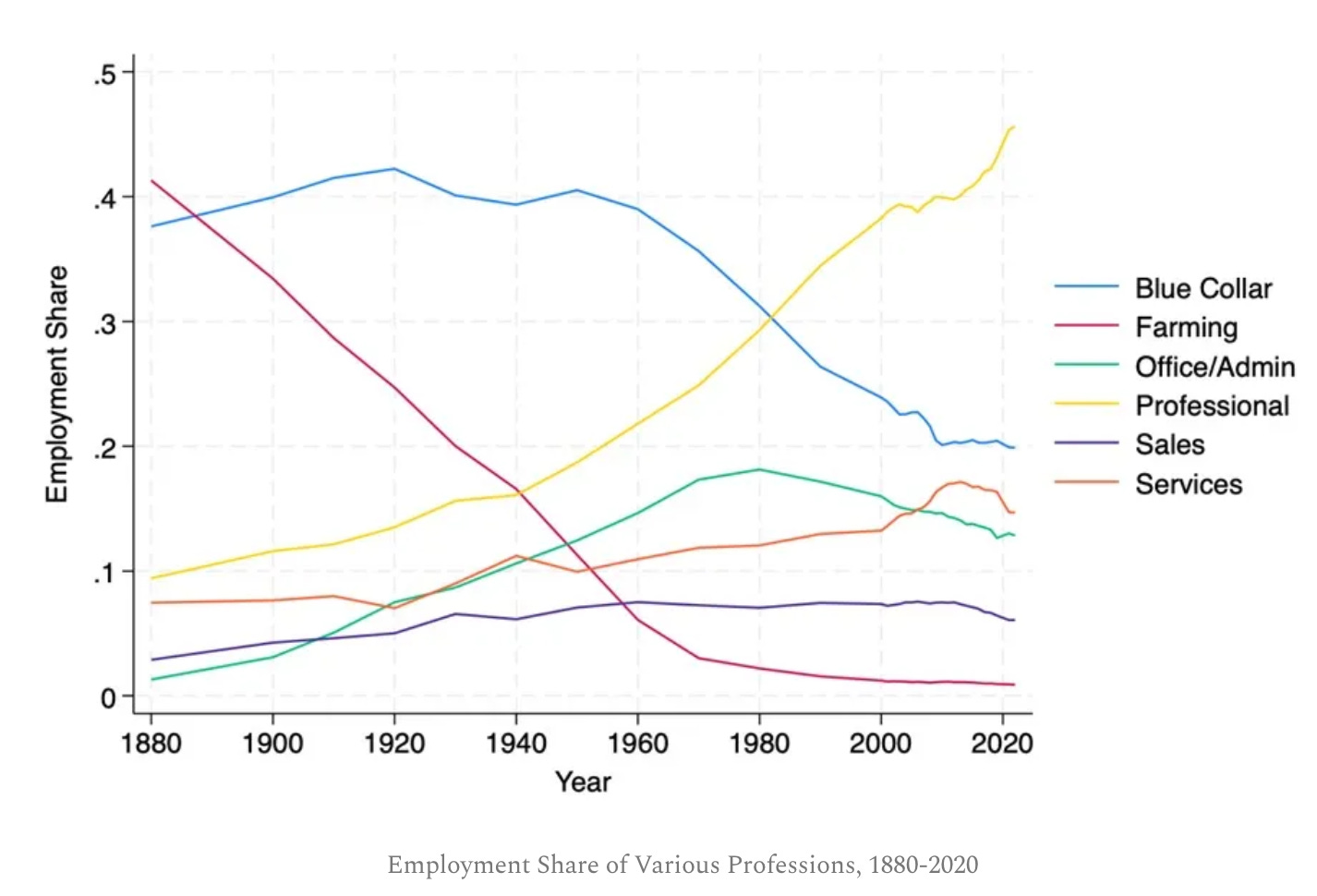No AI jobs apocalypse is coming!
Fears of AI's impact on the job market are overblown.
Greetings again from Paris, where I’m attending the gigantic VivaTech conference. This is my first mega-event in a while, and the global tech industry seems as fired-up about the future as ever. Nvidia CEO and global-rockstar Jensen Huang summed up the mood when he dismissed the latest apocalyptic prediction about AI’s impact on jobs as self-serving nonsense.
“I pretty much disagree with everything he says,” Huang said, addressing Anthropic CEO Dario Amodei’s predication to Axios that AI could eliminate half of entry-level jobs in five years. “He thinks AI is so scary, but only they should do it.” (Reporting by Business Insider’s Riddhi Kanetkar and Thibault Spirlet).
Huang’s diss of Amodei seemed so pointed and personal that I wondered whether there might be something else behind it.
And there might be!
According to Ryan Deffenbaugh in Investor’s Business Daily, Anthropic’s latest AI model, Claude Opus 4, was trained not on Nvidia chips but on Amazon chips, which Amazon hopes will provide much better price-performance. Chips that offer better price-performance might lead to lower margins for Nvidia. So, maybe Jensen had an unrelated reason to throw an elbow at Dario.
But, in any event, Jensen thinks AI will change jobs — including his — but that it will also create many more jobs than it will destroy.
I, too, have been working on the “jobs apocalypse” question — the idea that AI will soon decimate the job market, eliminating the need for human workers and throwing humanity into the chaos of unemployment, poverty, purposelessness, and wars.
My view is that these fears are overblown.
I think that AI will change many jobs, fast — and that those who don’t learn how to use it will be left behind. But I think most AI-job-doomsayers are missing the other part of the technology-jobs-disruption-equation — namely, that AI is also going to create a boatload of jobs.
What jobs will AI create?
Well, for starters, jobs for people who know how to use AI effectively — for example, younger people who began learning how to use AI in school when they and their friends used it to write their papers and do their homework.
And then other jobs that we don’t know about yet because we don’t need them today.
When I share this “but-AI-will-create-jobs-too” theory with AI-jobs-doomsayers, they explain that what I am missing is the speed with which AI will annihilate jobs. After all, they point out, AI is the fastest technology transformation in history, and — in their view — it will leave companies and humanity unable to adapt.
It’s true that AI adoption is extremely fast — it has only been 2.5 years since the “Big Bang” launch of ChatGPT 3 — but, as yet, anyway, we have not seen any seismic impacts on the job market.
Yes, we might be seeing the first ripples of trouble in the market for software developers and recent college grads, but there are other factors that are contributing to those trends. These include the uncertainty created by “Trumponomics” — it’s hard to plan when your President might change global trade rules radically overnight and doesn’t seem to care about the impact on your business — and the rapid downsizing of tech jobs after gross over-hiring during the COVID-stimulus boom.
Regardless, one big help for humans who want to stay employed is that large organizations — the ones that most humans work for — don’t change as fast as technology does. It takes time for people and companies and governments and schools to learn how to do things differently, even once technology is good enough. Big job-market changes happen over decades, not months or years. And, in the meantime, new companies and jobs are created.
This is not to say that AI won’t cause significant job disruption and that careers that seemed solid will become perilous and uncertain. But it is ever thus. As Jonas Prising, the CEO of staffing company Manpower, observed on a panel I moderated yesterday, a decade ago everyone agreed that the most future-proofed career on the planet was… software developer.
AI-driven job-market disruption will cause angst and pain, and we as a society need to think about the best ways to ease the transition.
But I just don’t see a world in which AI becomes so capable in 5-10 years that there’s no longer any work for humans to do. At least not in a world in which humans are still the most intelligent and capable beings on the planet. Overall, I’m less worried about a jobs apocalypse than an actual apocalypse — if, say, the AI entities we create decide that it’s not in their interests to have us around anymore, in part because we might decide to shut them down.
(The current consensus among AI experts is that there is a one-in-three chance that AI will destroy humanity. Not one in three thousand. One in three.)
The main reason I’m optimistic about the job market is that we have seen huge technology job disruption over the past three centuries, but we still have more jobs than ever. In the US, for example, despite all the technology disruption in the past half-century, the unemployment rate is still near a historic low.
Lots of jobs have been destroyed.
But lots more jobs have been created.
And I’m not yet convinced that AI is so radically different that it will break this pattern.
One of the smartest experts on technology job disruption is David Deming, a professor of political economy at Harvard’s Kennedy School. Professor Deming does great work on this topic, and — for those who don’t enjoy fighting their way through academic papers — he shares much of it on his Substack, “Forked Lightning.”
I’ll discuss more of Deming’s work in the weeks ahead. (We also recently recorded a podcast together, which we’ll release soon).
For now, I’ll leave you with three of Deming’s points and two of his charts:
First, job-market transitions take much longer than you might think. Technology changes fast, but people and organizations don’t.
Second, predictions of technology-driven job-market doom have accompanied prior tech transitions, too — and these forecasts have always been wrong.
And, third, despite everyone’s conviction that today’s tech changes are happening at an unprecedented speed, the fastest period of tech-job-disruption in the past century was actually the 1940s to the 1960s, and it was driven not by, say, the computer or the Internet, but by the gas-powered tractor.
This Deming chart shows US “job churn” by decade. Since 1880, the US economy — and the total number of jobs — has grown steadily, but the composition of the job market has continually changed. The fastest period of disruption was from the 1940s to the 1960s, as jobs (and people) moved from farms to cities.
Another Deming chart shows how the US job market has changed. The purple line in the chart below, for example, shows the decline of agriculture jobs as a percentage of the whole. In 1880, 40% of Americans worked on farms. Today, only 2% do.
So, yes, AI will change jobs and the job market. But there will still be plenty of work for people to do.
Thank you for reading Regenerator! We’re the publication for people who want to build a better future. We analyze the key questions in the innovation economy — tech, markets, policy, culture, and ideas.







Appreciate the perspective. I don’t know that the all-or-nothing lens is most relevant to the future of work conversation. Is a 20% trim to the balance sheet, rehiring down to a fraction, fewer new roles due to business AI usage mandates be more likely, which would cause massive ripples through the economy? Seems to me where the discussion should center.
It may not be an apocalypse right away, but in my humble opinion the current and near-term painful effects are being very seriously downplayed. Companies, governments and societies need to prepare, but the pace of change is daunting and the corporate temptation to pause hiring or downsize will be too great. The disruption could be serious -- but I don't expect the white-collar workforce to just lie down and accept it without protest (especially in conjunction with other painful realities around tariffs, immigration, political agendas, etc.)